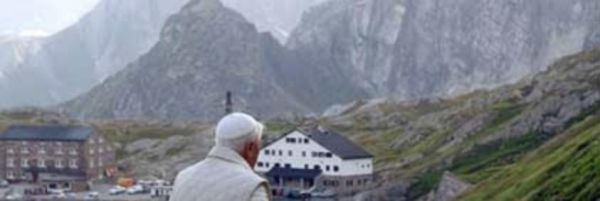In the life of the Church, the first steps she took, in a certain way, reflected what had happened in Jesus’ public life at Martha and Mary’s house in Bethany. Martha was completely taken up with the service of hospitality to offer to Jesus and his disciples; Mary, on the contrary, devoted herself to listening to the Lord’s word (cf. Lk 10:38-42). In neither case were the moments of prayer and of listening to God, and daily activity, the exercise of charity in opposition. Jesus’ reminder, “Martha, Martha, you are anxious and troubled about many things; one thing is needful. Mary has chosen the good portion, which shall not be taken away from her” (Lk 10:41-42) and, likewise, the Apostles’ reflection: “We will devote ourselves to prayer and to the ministry of the word” (Acts 6:4), show the priority we must give to God. I do not wish here to enter into the interpretation of this Martha-Mary passage. In any case activity undertaken to help one’s neighbor, “the other”, is not to be condemned, but it is essential to stress the need for it to be imbued also with the spirit of contemplation. Moreover, St Augustine says that this reality of Mary is a vision of our situation from heaven, so on earth we can never possess it completely but a little anticipation must be present in all our activities. Contemplation of God must also be present. We must not lose ourselves in pure activism but always let ourselves also be penetrated in our activities by the light of the word of God and thereby learn true charity, true service to others, which does not need many things — it certainly needs the necessary things — but needs above all our heartfelt affection and the light of God.
In commenting on the episode of Martha and Mary St Ambrose urges his faithful and us too: “Let us too seek to have what cannot be taken from us, dedicating diligent, not distracted attention to the Lord’s word. The seeds of the heavenly word are blown away, if they are sown along the roadside. May the wish to know be an incentive to you too, as it was to Mary, this is the greatest and most perfect act”. And he added that “attention to the ministry must not distract from knowledge of the heavenly word” through prayer (Expositio Evangelii secundunm Lucam, VII, 85 PL 15, 1720).
Saints have therefore experienced a profound unity of life between prayer and action, between total love for God and love for their brethren. St Bernard, who is a model of harmony between contemplation and hard work, in his book De consideratione, addressed to Pope Innocent II to offer him some reflections on his ministry, insists precisely on the importance of inner recollection, of prayer to defend oneself from the dangers of being hyper-active, whatever our condition and whatever the task to be carried out. St Bernard says that all too often too much work and a frenetic life-style end by hardening the heart and causing the spirit to suffer (cf.II, 3).
His words are a precious reminder to us today, used as we are to evaluating everything with the criterion of productivity and efficiency. The passage from the Acts of the Apostles reminds us of the importance — without a doubt a true and proper ministry is created — of devotion to daily activities which should be carried out with responsibility and dedication and also our need for God, for his guidance, for his light which gives us strength and hope. Without daily prayer lived with fidelity, our acts are empty, they lose their profound soul, and are reduced to being mere activism which in the end leaves us dissatisfied. There is a beautiful invocation of the Christian tradition to be recited before any other activity which says: “Actiones nostras, quæsumus, Domine, aspirando præveni et adiuvando prosequere, ut cuncta nostra oratio et operatio a te semper incipiat, et per te coepta finiatur”; that is, “Inspire our actions, Lord, and accompany them with your help, so that our every word and action may always begin and end in you”. Every step in our life, every action, of the Church too, must be taken before God, in the light of his word.
[Pope Benedict, General Audience 25 April 2012]












